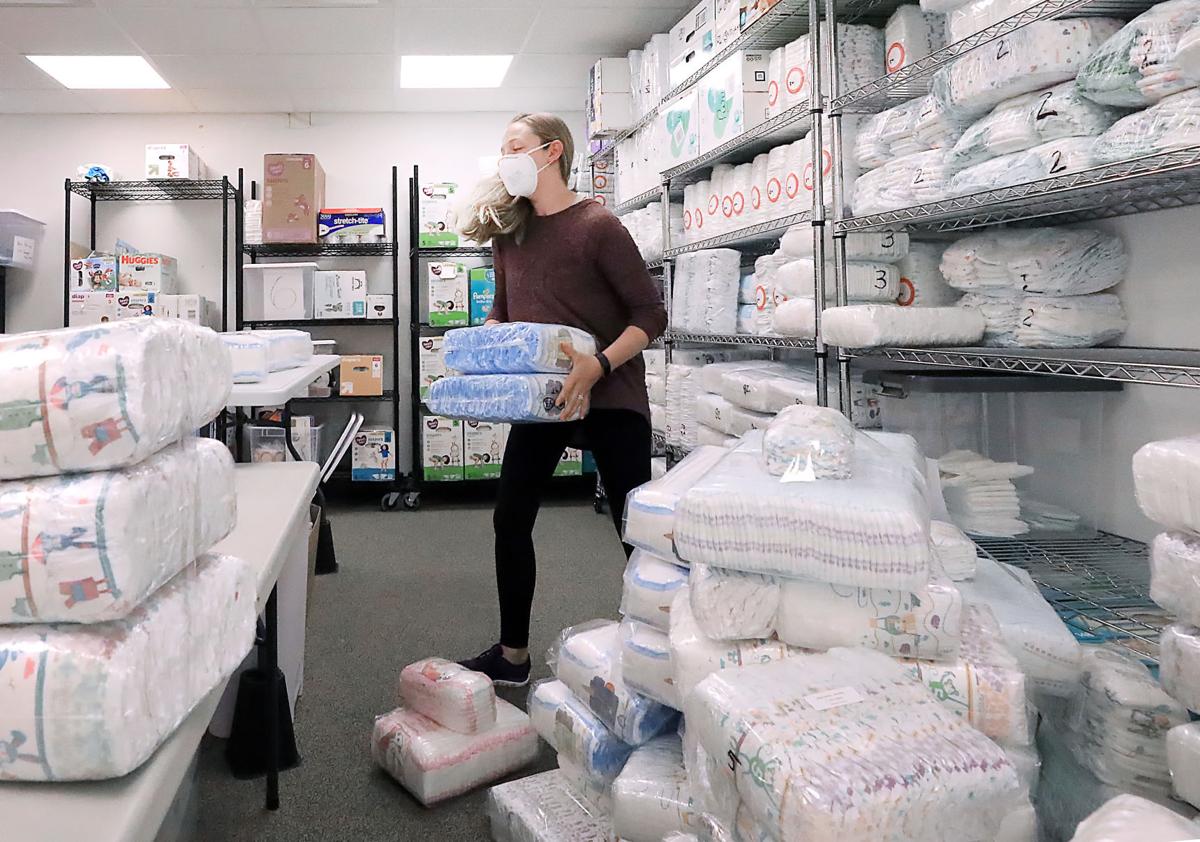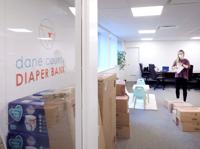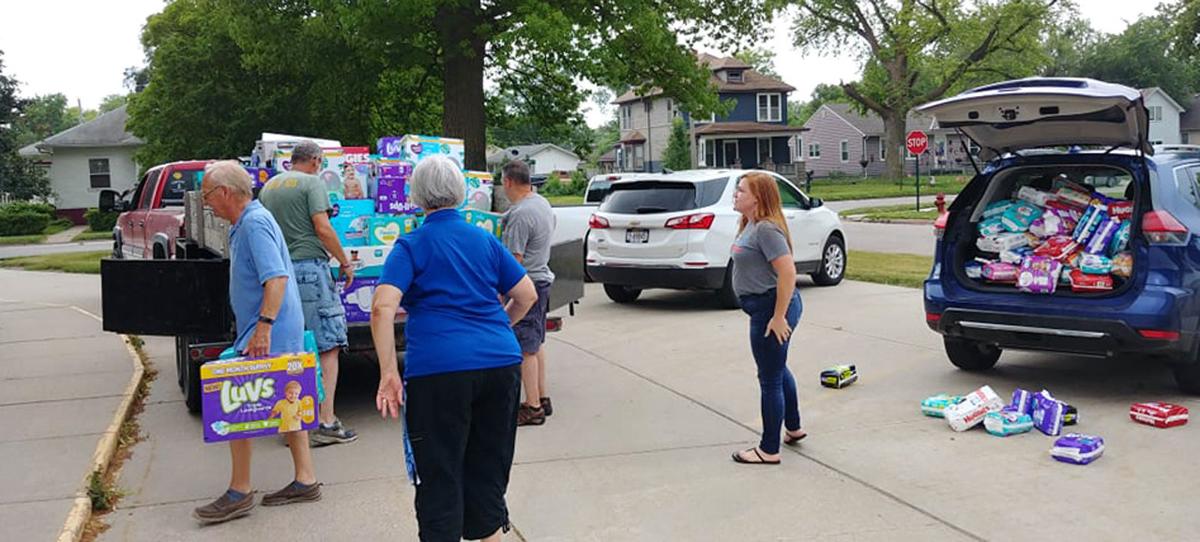
Dane County Diaper Bank founder and executive director Megan Sollenberger sorts packages of donated diapers inside the program's office in Verona.
When Megan Sollenberger asked family and friends affected by Hurricane Harvey in 2017 what they needed most, the overwhelming response was diapers.
Sollenberger lived in Texas for a year before moving to Wisconsin and wanted to help out in some way. A mom of two young children, she was “really shocked” to learn about diaper need across the country because of the lack of coverage in that area from federal assistance programs.
“Even when folks are receiving help, they’re not receiving the basic necessities,” she said. “You can’t get more basic than diapers.”
After raising money for the Houston Diaper Bank via a birthday fundraiser, Sollenberger dove further into diaper need.
The problem
According to the National Diaper Bank Network, federal assistance programs like SNAP and WIC can’t help in the diaper department, but 1 in 3 families in the U.S. experience diaper need.
Diaper need is defined as the lack of a sufficient supply of diapers to keep an infant or child clean, dry and healthy.
“A lot of people have no idea the problem even exists,” Sollenberger said.

Sollenberger works inside the office at 524 W. Verona Ave.
By spring 2018, Sollenberger founded and became the executive director of the Verona-based Dane County Diaper Bank. The first official distribution of diapers came along in October of that year.
The goal was to make it easy for everyone to get the necessities without income requirements or an intake process. The diaper bank partnered with local organizations to further its reach, like Fitchburg-based nonprofit Reach Dane and its Early Head Start program, which help get the diapers delivered straight to doors.
There are over 150,000 infants, toddlers and mothers who participate in Early Head Start programs across the U.S., and 2,789 are in Wisconsin.
A huge need
Andrea Steliga, a family advocate with Reach Dane, said her work in the Early Head Start program prior to the COVID-19 pandemic involved 90-minute weekly home visits with low-income pregnant women and families with children ages 0 to 3. The visits, which now happen mostly through phone calls and texts, focus on child development, case management and connecting people to various resources.
“It’s a huge need the diaper bank has been helping us with,” Steliga said. “That’s the number one thing that people ask for, especially because they’re really expensive.”
With infants needing up to 12 diapers a day and toddlers needing about eight, it can cost around $80 per month per child for disposable diapers.

Andrea Steliga carries donations of diapers to her waiting vehicle outside the Dane County Diaper Bank.
Steliga said before partnering with the diaper bank, Reach Dane was only able to provide families some 10 diapers a month. Now, families get around 90 diapers per child per month or 45 pull-ups per child per month. During the pandemic, when the diaper bank has been serving around 150 children, the diapers are left outside homes.
Edgerton resident Jean O’Brien was 57 years old and on Social Security when her two grandchildren came under her care after her daughter died in childbirth in 2016. The two boys, now 11-year-old Kalub Georgeson and 3-year-old Khalyn Seals, have been with her since but not without difficulty.
“You don’t have a lot of money on Social Security,” O’Brien, now 61, said. “You sometimes have to decide between food or medicine or diapers.”
Soon after getting the newborn and young boy, she started with the Early Head Start program and was getting a month’s supply of diapers then pull-ups on the first of every month until the baby no longer needed them in December 2019.
O’Brien said having the steady supply of not only diapers but also a support system “made a huge difference.”
“To know there’s somebody that goes to people and fills a huge need for children and does it with little fanfare, I’m just so grateful,” she said.
She said the lack of diaper care in federal assistance programs is a “nationwide problem that has never been fixed,” but Sollenberger found a need and filled it.
Hope for the future
Sollenberger, who recently left her job at Epic Systems to pursue the diaper bank full-time, said more revenue was raised in the last few months during the COVID-19 pandemic than in the entire first year the diaper bank was open.

From left, volunteers Rose Yang, Alaria Petrulis and Kalpana Rizal carry armloads of donated diapers to waiting vehicles outside the diaper bank in Verona.
Since March, over 4,800 diapers have been dropped off to a donation bin outside of the diaper bank at 524 W. Verona Ave, some 23,000 diapers have been put on the diaper bank’s Amazon Wish List and almost 10,000 diapers were donated through a virtual diaper drive done by Alliant Energy.
“People who aren’t struggling are realizing it is time to step up and do something for people who are during this tough time,” Sollenberger said.
Although the office is only open to accept donations outside during the pandemic, the diaper bank has still been working with partner organizations to coordinate drop-offs, including Reach Dane and the Dane County Community Defense. The diaper bank also recently started working with the River Food Pantry and donated a few thousand diapers.
The diaper bank has doubled its monthly output during the pandemic from roughly 11,000 diapers per month to one partner organization to now getting 21,000 diapers out across four partner organizations.
Sollenberger said she doesn’t see how the lack of federal assistance when it comes to diaper need could be fixed, but diaper banks across the country are scratching the surface.
“Given the current state of the world, this problem is going to absolutely multiply and magnify in the short term depending on the fallout,” she said. “But if you’re privileged enough during all of this, you can think about how to help those who are struggling.”
Sollenberger said people who are interested in learning more about the diaper bank and donating can visit danediapers.org.

Maria Luisa loads diapers into the trunk of her vehicle for drop offs.
She hopes by taking on the diaper bank full-time and with the help of volunteers and donations, it will grow significantly in the next year. She said she was able to raise $30,000 a year putting in 5 to 10 hours a week and would like to see that multiply while she is putting in more hours.
“This work really helps people meet their full potential by allowing them to actually focus on things like school and growth,” she said. “If you’re not able to provide the basics, that’s really tough, but we can do something about it.”
<&rdpStrong>COVID-19 in photos: How Wisconsin is managing the pandemic</&rdpStrong>
Sign up now to get the most recent coronavirus headlines and other important local and national news sent to your email inbox daily.
August 10, 2020 at 09:30PM
https://ift.tt/3acAgdq
‘You can’t get more basic than diapers’: Dane County Diaper Bank covers gap in federal assistance programs - Madison.com
https://ift.tt/2Comt7j
Diapers


No comments:
Post a Comment